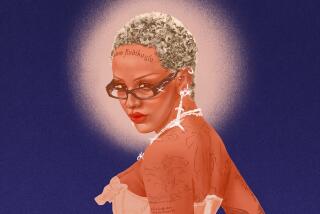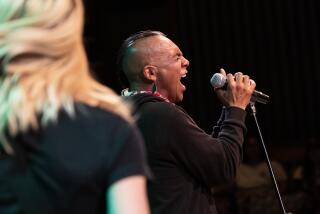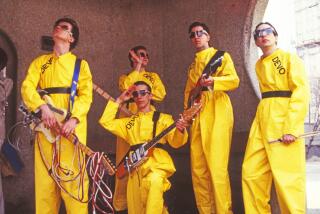A Pair of Rant ânâ Rollers : Protest: Rage Against the Machine is dedicated to restoring angry social commentary to rock.
Itâs hard to imagine a more unlikely rock couple than Zack de la Rocha, a 22-year-old Chicano who grew up alienated in Irvine and cut his musical teeth on punk-rock and hip-hop, and Tom Morello, 28, a Harvard-educated African-American with a taste for aggressive rock.
As the spearheads of the Los Angeles band Rage Against the Machine, theyâre dedicated to restoring angry social commentary to rock.
Their juxtaposition of punk and hip-hop and their combination of sound and fury quickly drew an audience as the band worked the L.A. clubs, and little more than a year after its formation, Rage has just released its debut major-label album on Epic Records. (The band plays at SOMA in San Diego tonight and at the Coach House in San Juan Capistrano on Sunday.)
With bone-crushing punk/metal/funk riffs, a relentless rhythm section (drummer Brad Wilk and bassist Timmy C.), De la Rochaâs battle-cry rapping, and sonic effects that prompted a âno samples, no synthesizersâ notice on the package, âRage Against the Machineâ is one of the fiercest pieces of music to come out of the L.A. rock scene in years.
âThe ideal for the album was to capture the intensity and the rawness of the band live,â says Morello. âWhen I first listened to records Iâd often be disappointed when I saw a band live, âcause the records sounded much better than the bands. These days it seems the other way around, where bands have an intangible intensity live which they canât capture on records.â
But Morello and De la Rocha have political militancy in their bloodlines. Morelloâs father participated in Kenyaâs liberation struggle in the late â50s and early â60s, and his mother was a civil rights activist. De la Rochaâs father, Roberto, was a member of the East L.A. collective of activist artists known as Los Four.
For the two musicians, messages of cultural and political empowerment are the key to the band, and that starts with the name.
âI just felt it applied in the kind of message we were trying to put at the forefront of our music,â says De la Rocha. âI wanted to think of something metaphorically that would describe my frustrations toward America, toward this capitalist system.â
De la Rocha, the rebellious lone Chicano in a white high school--he lived with his mother in Irvine from age 5--went through a drug phase and then was drawn to the spartan wing of punk known as straight-edge. He entered the rap and hip-hop world when he started break-dancing.
In contrast to his partnerâs street-honed politics, Morello went to Harvard to become a militant rocker, graduating with honors in social science.
âIt certainly didnât enhance my guitar playing, except for giving me a little more Angst . It helped to intellectually arm me to understand the society and the world in which I live and to help tackle the problems that I see there.â
When the four musicians met, the chemistry felt right. They werenât sure the audience would feel the same way about their radical raps, but Morello has been pleasantly surprised.
âMaybe sometimes they just get off on the riffs, sometimes the riffs seduce them into the politics, sometimes they maybe just get off on the lyrics and they tolerate the riffs. Overall, from reading mail people send us and talking to people, it seems like it is something that has impact on a lot of people. And it seems thereâs definitely a void that this band is filling.â
More to Read
The biggest entertainment stories
Get our big stories about Hollywood, film, television, music, arts, culture and more right in your inbox as soon as they publish.
You may occasionally receive promotional content from the Los Angeles Times.










